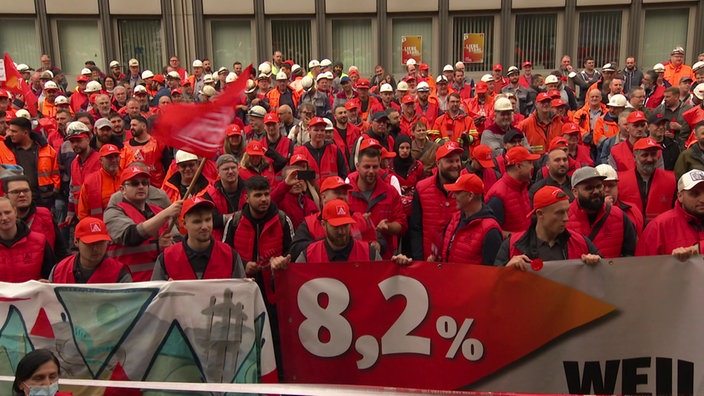In the collective bargaining in the steel industry, the IG-Metall union leadership and the steel employers' association agreed on a new collective agreement on 15 June. According to the agreement, 6.5 per cent more wages will be paid as of 1 August. In addition, a one-off payment of 500 euros, or 200 euros for apprentices, will be paid. The new collective agreement, which will run for 18 months, has so far been negotiated for the states of North Rhine-Westphalia, Lower Saxony and Bremen. Here alone 68,000 workers are employed in the steel industry.
Warning strikes have taken place in various cities in recent weeks, with tens of thousands of workers taking part. For example, in Duisburg, in Salzgitter and in Bremen. Strikes have also taken place in eastern German cities, where no agreement has yet been reached in collective bargaining. However, it is assumed that the conditions of the collective agreement negotiated in West Germany will simply be adopted in the East.

Strike rally in Duisburg at Thyssen Krupp Steel on 09 June 2022
During the strikes, the workers expressed their demands clearly and unambiguously. The demand for full compensation for inflation was particularly prominent. The original demand was for an 8.2 per cent wage increase. For example, a worker at the Arcelor Mittal steel company in Bremen said in an interview with a local news channel: "We have inflation of 7.9 per cent and we can't be fobbed off with a one-off payment, it's all no longer working." Another worker said, "8.2 per cent and no less it must be, that's what we are standing here for today."
But the union bureaucrats in the IG Metall leadership now agreed to the proposal of 6.5 per cent more pay. However, as the worker quoted said, inflation in the FRG is currently at 7.9 per cent. This means that not even the inflation will be compensated by the wage increase, which makes the new collective agreement a total farce. As usual, the union leadership does not do justice to the justified demands and the fighting spirit of the workers. A union leadership that does not meet the demands, that does not act in the interest of the workers and only negotiates lazy compromises is not needed by the working class. It does not need compromises with the capitalists, but a clear edge and a leadership that leads the fighting spirit of the workers so that the workers achieve their goals. What is needed are militant trade unions that are able to lead the workers' struggles, to defend what is on the verge of being lost and to fight anew for what is necessary. In times of crisis, when the rulers are trying to take away what we have already fought for, this need for a militant organisation of the working class becomes all the more urgent.










